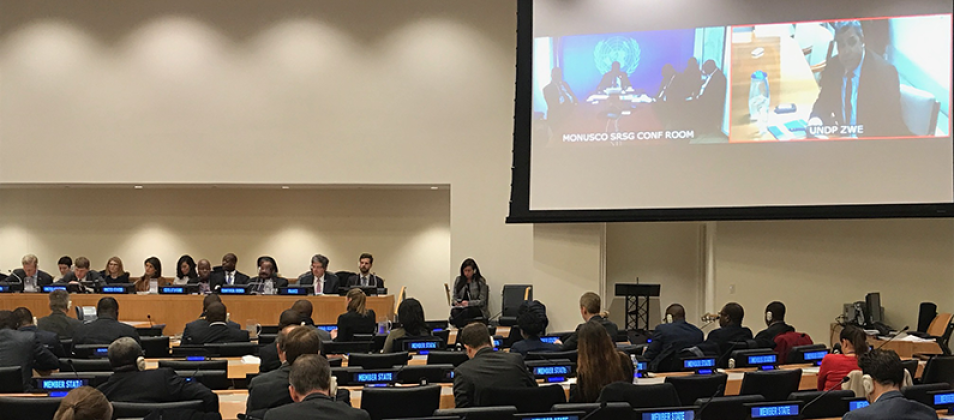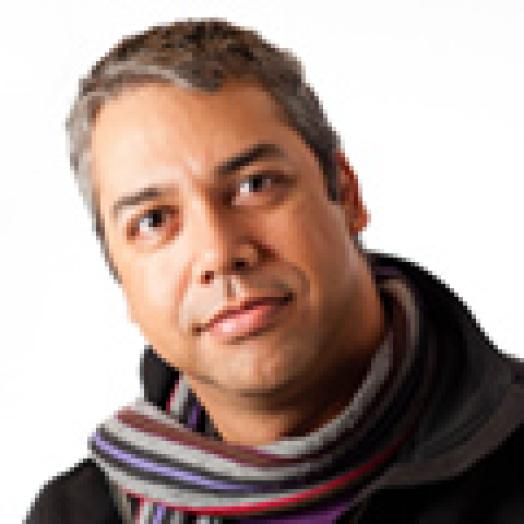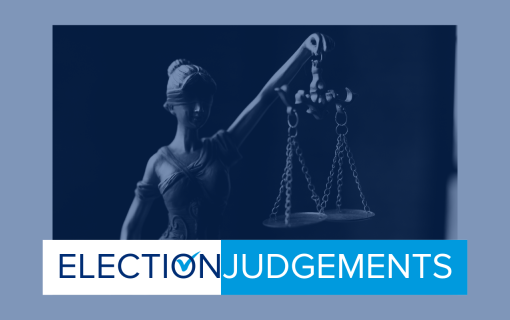
Africa Director Rushdi Nackerdien Briefs the UN Security Council on the DRC
On February 12, International Foundation for Electoral Systems (IFES) Africa Director Rushdi Nackerdien briefed the United Nations (UN) Security Council during an Arria Formula Meeting on “The Electoral Process in the Democratic Republic of the Congo.” He was invited to speak to the electoral calendar, progress and challenges to the electoral cycle, and the potential implementation of electronic voting machines.
A recording of the briefing is available below, and a written version of Nackerdien’s oral testimony follows:
Thank you, Ambassador Haley, Your Excellencies, Deputy Prime Minister and Minister of Foreign Affairs She Okitundu.
On behalf of the International Foundation for Electoral Systems, I deeply appreciate this opportunity to discuss the electoral process in the Democratic Republic of the Congo [DRC].
With generous contributions from international partners, IFES supports credible electoral processes by partnering with both election management bodies and civil society. IFES has historically provided technical assistance in the DRC, since 1999 through 2013. In more recent times, IFES has conducted an assessment of the voter registration plans in the DRC and has followed closely developments regarding electoral preparations. As an election professional, I have also personally been involved on the ground as part of the South African delegation that supported the 2006 electoral results process in the DRC.
Your Excellencies, elections are complex, and if not conducted adequately, can be the spark that ignites existing tensions. The legitimacy of an election largely depends on the actual and perceived integrity of the electoral process. If voters and candidates believe an election was unfair or poorly-administered, they may not accept the outcome.
The delayed elections in the DRC – a country the size of Western Europe – present formidable challenges. The public has low levels of trust in the electoral institution, but high expectations that the ballot box will be a mechanism for reform and stability: A survey by the Congo Research Group demonstrates that Congolese are keen to go to the ballots, despite the political challenges.
On Election Day (December 23), more than 46 million registered voters will have the opportunity to cast their ballots for close to 60,000 candidates across three elections. With less than a year to go, there are many unknowns:
- Will key benchmarks be met?
- How many candidates will appear on the ballot?
- Will the Congolese use voting machines, or paper ballots?
- Will the election commission receive sufficient and timely funding?
- What support will be received from the international community?
- How will the diaspora and conflict-displaced voters register?
The November 2017 publication of the electoral calendar was a major milestone. While voter registration was completed six months later than planned, the register contains 12 percent more voters than anticipated. The lengthy registration exercise has provided the CENI [Independent National Electoral Commission] with a rich foundation from which to complete the electoral process. However, in order to have a clean database for the nomination process, the raw data still needs to be checked for errors or duplicates.
The DRC has been here before. In 2006, it conducted the first post-conflict elections with significant international assistance. The 2011 election was heavily criticized as falling short of the 2006 elections with regards to management of the process, as well as credibility of the outcome. Those elections in particular were fraught with concerns over voter fraud, stemming from vote counting and aggregation. Currently, there is a high level of skepticism among local stakeholders and voters about the CENI. Distrust in the CENI has increased and key confidence-building measures from the December 2016 accord still stand unaddressed, with high expectations of continued social conflict.
In the coming months, the CENI must tackle the aggressive calendar in order to meet the December 23 deadline. The most critical benchmarks include the redistribution of seats and candidate nomination. It is the CENI’s duty to increase transparency, engage political parties, share much more information than it has previously, and embark on a massive voter outreach process to educate citizens about the upcoming process.
The election calendar currently factors in the printing and distribution of about 160 million ballot papers. However, a question mark has been raised regarding the introduction of automated voting and counting on Election Day. On a single day, roughly 106,000 machines must work flawlessly across 90,000 polling stations. These machines must print ballots on demand; these count will then be electronically transmitted, as well as ballots manually counted for later submission.
These machines could potentially improve the speed and accuracy of results transmission; save time on the printing and distribution of ballots; reduce the costs of paper and voting booths; bring a more efficient tabulation of results at compilation centres; and reduce the weight of deployed materials, resulting in significant savings, if all went perfectly.
However, with just 11 months to go, these machines still need to be tested, configured, deployed and used in a tense, mistrustful context. CENI staff must be trained and 46 million voters need to receive education. Securing these machines and the data they transmit from cyberattacks will be critical and challenging. Stakeholders must be given access to the data-tracking process, especially as the electronically transmitted results will arrive quickly, while the manual count could come up to 30 days later. Technical support staff must stand ready to quickly and accurately troubleshoot any issues that may arise.
The voter registration exercise shows that the CENI is capable of rolling out large scale processes in a long-term, phased approach. Will the same level of success be possible in a single, high-pressure day – Election Day? There will need to be sufficient mechanisms to tackle machine failure, voter ignorance, insufficiently trained staff and transmission challenges. Given the scale of the country, and the amount of time available, with limited flexibility, the CENI will require significant support from the international community to deliver a credible election that meets the expectations of Congolese.
Across the African continent, citizens are demanding a higher level of electoral integrity than ever before. High levels of litigation and election-related violence reflect these unmet demands. The CENI in the DRC has a formidable task to take concrete, visible steps to address perceptions or allegations of political bias. Access to electoral data must be increased to all relevant stakeholders. Communications with citizens must be improved. The international community must step forward with clear support to meet electoral timelines.
Finally, elections do not take place in a political vacuum. All political leaders must commit both through words and actions to respect and support the calendar, electoral process and institution, campaign environment and the ultimate outcomes. These elements can combine to see a credible election in the DRC.
Excellencies, thank you again for this opportunity to address you. I am happy to answer any questions you may have.
The briefing was moderated by U.S. Ambassador to the UN, T.H. Nikki R. Haley; Nackerdien was joined on the panel by Mr. Jean-Pierre Lacroix, USG for Peacekeeping Operations, UN; Mr. Corneille Nangaa, President of Independent National Electoral Commission (CENI); and Ms. Ida Sawyer, Central African Director at Human Rights Watch.
Remarks were also given by each member of the UN Security Council; H.E. Mr. Leonard She Okitundu, Deputy PM and Minister of Foreign Affairs (DRC); Special Representative and Head of the African Union Office in DRC, Ambassador Abdou Abarry; H.E. Mr. João Pedro Vale de Almeida, Permanent Observer from the European Union; H.E. Mr. Raymond Serge Balé, Permanent Representative, Republic of Congo, representing the International Conference of the Great Lakes Region; H.E. Julio Helder Moura Lucas, Deputy Permanente Representative, Angola, representing Southern African Development Community; and H.E. Adonia Aybere, Permanent Representative, Uganda.










